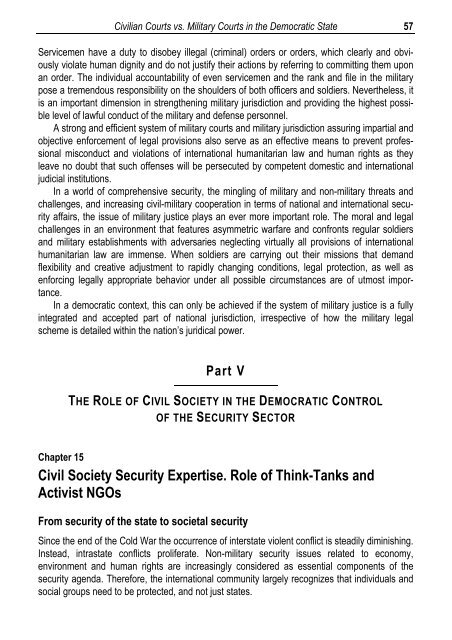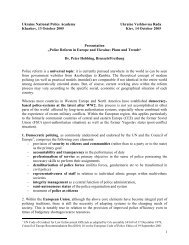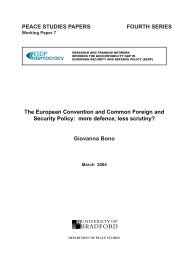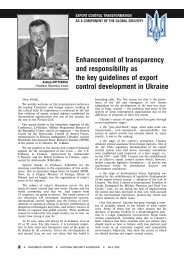Civil-Military Relations and Democratic Control of the Security Sector
Civil-Military Relations and Democratic Control of the Security Sector
Civil-Military Relations and Democratic Control of the Security Sector
Create successful ePaper yourself
Turn your PDF publications into a flip-book with our unique Google optimized e-Paper software.
<strong>Civil</strong>ian Courts vs. <strong>Military</strong> Courts in <strong>the</strong> <strong>Democratic</strong> State<br />
Servicemen have a duty to disobey illegal (criminal) orders or orders, which clearly <strong>and</strong> obviously<br />
violate human dignity <strong>and</strong> do not justify <strong>the</strong>ir actions by referring to committing <strong>the</strong>m upon<br />
an order. The individual accountability <strong>of</strong> even servicemen <strong>and</strong> <strong>the</strong> rank <strong>and</strong> file in <strong>the</strong> military<br />
pose a tremendous responsibility on <strong>the</strong> shoulders <strong>of</strong> both <strong>of</strong>ficers <strong>and</strong> soldiers. Never<strong>the</strong>less, it<br />
is an important dimension in streng<strong>the</strong>ning military jurisdiction <strong>and</strong> providing <strong>the</strong> highest possible<br />
level <strong>of</strong> lawful conduct <strong>of</strong> <strong>the</strong> military <strong>and</strong> defense personnel.<br />
A strong <strong>and</strong> efficient system <strong>of</strong> military courts <strong>and</strong> military jurisdiction assuring impartial <strong>and</strong><br />
objective enforcement <strong>of</strong> legal provisions also serve as an effective means to prevent pr<strong>of</strong>essional<br />
misconduct <strong>and</strong> violations <strong>of</strong> international humanitarian law <strong>and</strong> human rights as <strong>the</strong>y<br />
leave no doubt that such <strong>of</strong>fenses will be persecuted by competent domestic <strong>and</strong> international<br />
judicial institutions.<br />
In a world <strong>of</strong> comprehensive security, <strong>the</strong> mingling <strong>of</strong> military <strong>and</strong> non-military threats <strong>and</strong><br />
challenges, <strong>and</strong> increasing civil-military cooperation in terms <strong>of</strong> national <strong>and</strong> international security<br />
affairs, <strong>the</strong> issue <strong>of</strong> military justice plays an ever more important role. The moral <strong>and</strong> legal<br />
challenges in an environment that features asymmetric warfare <strong>and</strong> confronts regular soldiers<br />
<strong>and</strong> military establishments with adversaries neglecting virtually all provisions <strong>of</strong> international<br />
humanitarian law are immense. When soldiers are carrying out <strong>the</strong>ir missions that dem<strong>and</strong><br />
flexibility <strong>and</strong> creative adjustment to rapidly changing conditions, legal protection, as well as<br />
enforcing legally appropriate behavior under all possible circumstances are <strong>of</strong> utmost importance.<br />
In a democratic context, this can only be achieved if <strong>the</strong> system <strong>of</strong> military justice is a fully<br />
integrated <strong>and</strong> accepted part <strong>of</strong> national jurisdiction, irrespective <strong>of</strong> how <strong>the</strong> military legal<br />
scheme is detailed within <strong>the</strong> nation’s juridical power.<br />
Part V<br />
THE ROLE OF CIVIL SOCIETY IN THE DEMOCRATIC CONTROL<br />
OF THE SECURITY SECTOR<br />
Chapter 15<br />
<strong>Civil</strong> Society <strong>Security</strong> Expertise. Role <strong>of</strong> Think-Tanks <strong>and</strong><br />
Activist NGOs<br />
From security <strong>of</strong> <strong>the</strong> state to societal security<br />
Since <strong>the</strong> end <strong>of</strong> <strong>the</strong> Cold War <strong>the</strong> occurrence <strong>of</strong> interstate violent conflict is steadily diminishing.<br />
Instead, intrastate conflicts proliferate. Non-military security issues related to economy,<br />
environment <strong>and</strong> human rights are increasingly considered as essential components <strong>of</strong> <strong>the</strong><br />
security agenda. Therefore, <strong>the</strong> international community largely recognizes that individuals <strong>and</strong><br />
social groups need to be protected, <strong>and</strong> not just states.<br />
57

















